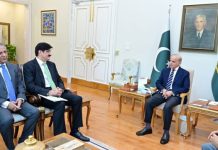PARIS: A US-sponsored resolution to consider placing Pakistan on a watchlist of countries that financially aid terrorism remained inconclusive after a meeting of the Financial Action Task Force (FATF) concluded on “no consensus”, Foreign Minister Khawaja Asif informed.
The minister confirmed on Twitter that “no consensus [could be reached] for nominating Pakistan” to be added to the FATF’s list of nations that monetarily support terrorism.
Expressing gratitude at the decision, Asif said Pakistan’s efforts paid off and the convening states proposed a “three months pause” and asked for the Asia Pacific Group, which is part of FATF, to consider “another report in June”.
“Grateful to friends who helped,” the minister added.
 FATF is a global body that combats terrorist financing and money laundering. Pakistan has been scrambling in recent months to avoid being added to a list of countries deemed non-compliant with anti-money laundering and terrorist financing regulations by the FATF, a measure that officials fear could hurt its economy.
FATF is a global body that combats terrorist financing and money laundering. Pakistan has been scrambling in recent months to avoid being added to a list of countries deemed non-compliant with anti-money laundering and terrorist financing regulations by the FATF, a measure that officials fear could hurt its economy.
FATF member states have been meeting this week in Paris, where it was expected that they would decide on the US motion, backed by Britain, France and Germany, to have Pakistan added to the so-called “grey list” of countries which are not doing enough to comply with terrorist-funding regulations.
‘FATF’s deliberations confidential until made public’
In Washington, a State Department official, speaking on condition of anonymity, could not confirm that FATF deferred action for three months, pointing out that the organisation’s deliberations are confidential until it makes them public.
The international community continues to have concerns about deficiencies in Pakistan’s anti-money laundering and counter-terrorism financing system even though Islamabad has begun taking steps to address the flaws, said the State Department official without elaborating.
Pakistan earlier this year submitted a report about the progress it had made in curbing terrorist financing, but Washington submitted its motion before the Pakistan report could be discussed at the Paris hearing.
Dr Miftah Ismail in Paris
Prime Minister’s Adviser on Financial Affairs Dr Miftah Ismail reached Paris earlier this week to attend the FATF meeting.
According to official sources, Ismail visited Germany, Belgium, and the Netherlands the week before in an attempt to garner support against the US move.
A delegation — led by Syed Mansoor Shah, the director-general of the Financial Monitoring Unit and comprising officials of the foreign and interior ministries — was also in Paris to defend the country’s position at the FATF meeting.
Pakistan had expressed serious concerns over the US motion, saying its international credit rating could suffer a setback as a result of being placed on the list, as several global financial institutions are influenced by the FATF.
The FATF includes around 700 members in total, including the United Nations, European Commission, International Monetary Fund and World Bank.
The FATF is working together with the Asia/Pacific Group on Money Laundering (APG), which, as per its website, aims to ensure “that its members effectively implement the international standards against money laundering, terrorist financing and proliferation financing related to weapons of mass destruction”.
After 9/11, “the APG expanded its scope to include the countering of terrorist financing”.



